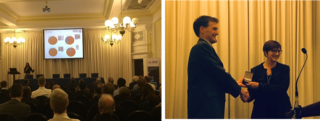-
A dozen organisations cooperate in combustion-related UK research
Date posted:
-
-
-
Post Author
Philip SharmanIFRF Director
-
-

I don’t think that any of us would argue with the view that the world of combustion has faced unprecedented challenges in the last few years – and none more so than 2019!
We are no longer talking in terms of an ‘energy transition’ over a number of decades towards a lower carbon world… we are now facing the reality of what many are describing as an environmental emergency, one necessitating a very rapid move to global ‘net-zero’ emissions. By “very rapid”, we are talking in terms of the next 30 years – and hopefully somewhat less – and the “global net-zero” CO2 emissions ambition means that while many nations and regions will continue to exploit fossil fuels in their power generation, industrial process, heating and transport sectors (albeit in increasingly cleaner ways), other nations and regions will need to develop and exploit ‘negative-emission’ technologies to compensate. Should we fail in this endeavour the consequences are becoming increasingly clear and frightening – irreversible and catastrophic climate change with all of its attendant impacts, large-scale species extinction, desertification, mass migration of peoples, increasingly scarce resources, etc.
Such prospects are propelling the ‘combustion industries’ to undertake urgent research and development into a wide range of technology options – many of which we have been examining over recent months in our Monday Night Mail e-newsletter – including the large-scale deployment of combined heat and power (CHP) and district heating schemes, advanced energy-from-waste (EfW) technologies, bioenergy (including biomass and biofuel options), zero-carbon fuels and/or vectors such as hydrogen and ammonia, industrial process fuel switching (‘refuelling’), carbon capture and storage (CCS) technologies suitable for challenging industrial applications, carbon capture and utilisation (CCU) technologies/products, bioenergy-CCS (‘BECCS’), process, heat and transport electrification, heat pumps, direct reduction of biomass/waste, synergies with renewables and energy storage systems (electrical and heat energy), ‘smart’ energy systems integration, etc. This urgent priority to develop and deploy very-low-carbon or negative-emission technologies and to re-fuel and/or repurpose combustion technologies, will require all facets of the combustion industries to collaborate and innovate to an extent that it has never had to in the past, and will require a new generation of highly-trained combustion scientists, researchers, engineers, industrialists and entrepreneurs to rise to the challenge.
It is within this highly challenging context that, almost a year ago, eight UK organisations involved in combustion-related R&D agreed to meet together and explore how we could ‘pull-together’ and find ways of catalysing such a transition by coordinating our activities, collaborating with and reinforcing each other’s initiatives, and encouraging the next generation of combustion researchers. This open-agenda meeting – initiated by IFRF and chaired by the President of IFRF’s British Flame Research Committee (BFRC) – identified a number of positive mechanisms and activities, the first of which are already bearing fruit (see below)!
The eight organisations that met last October have now been joined by four others, and, together, these 12 bodies[1] organised and staged a successful workshop on combustion research and an inaugural ‘Clean Energy Science Lecture’ in London last week.
The afternoon workshop – featuring presentations by six enthusiastic young researchers on their PhD projects supported by BF2RA and CCS-CFE CDT, an update from IFRF General Secretary Professor Mohamed Pourkashanian on the University of Sheffield’s Translational Energy Research Centre (UK national facilities for clean energy innovation) and a discussion on the opportunity to establish an ‘advocacy group’ for the promotion of clean energy issues (led by myself from IFRF and Stuart Mitchell of Doosan Babcock/BF2RA). Around 80 registered participants enjoyed hearing about a wide range of combustion research topics – performance of advanced steel welds in power plant, corrosive emissions from biomass/waste combustors, degradation and segregation of wood pellets in power generation, the impact of impurities on salt formations used as underground gas storage caverns, agglomeration during fluidised bed combustion of biomass, and the production and characterisation of bio-binders.
After a networking and refreshment break, during which the audience was swelled by additional participants, an evening lecture – ‘Evolution or Revolution: A personal journey of the UK power industry towards a sustainable future’ – was presented by Dr Nina Skorupska, CBE, FEI, Chief Executive of Renewable Energy Association. Nina’s entertaining lecture charted her own varied career path from coal science researcher to renewable champion against the backdrop of major changes in the UK power sector, reinforcing the key messages of the day concerning the challenging but exciting transitions to a net-zero emissions energy sector. The evening ended with Nina being awarded the inaugural Clean Energy Science Medal by Dr Will Quick (Uniper), President of FERF, followed by a buffet dinner coupled with plenty of networking.
[1] The 12 organisations involved in this initiative are: Advanced Power Generation Technology Forum (APGTF); Biomass & Fossil Fuel Research Alliance (BF2RA); British Flame Research Committee (BFRC); Combustion Institute – British Section; EPSRC Centre for Doctoral Training (CDT) in Carbon Capture & Storage and Clean Fossil Energy (CCS-CFE CDT); EPSRC CDT in Resilient Decarbonised Fuel Energy Systems (RDFES CDT); Fuel & Energy Research Forum (FERF); Institute of Physics (IoP) – Combustion Physics Group; Institution of Chemical Engineers (IChemE) – Clean Energy Special Interest Group; International Flame Research Foundation (IFRF); Royal Society of Chemistry (RSC) – Energy Sector; UK Carbon Capture & Storage Research Centre (UKCCSRC).
